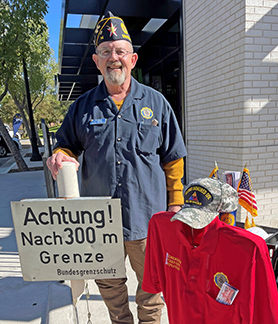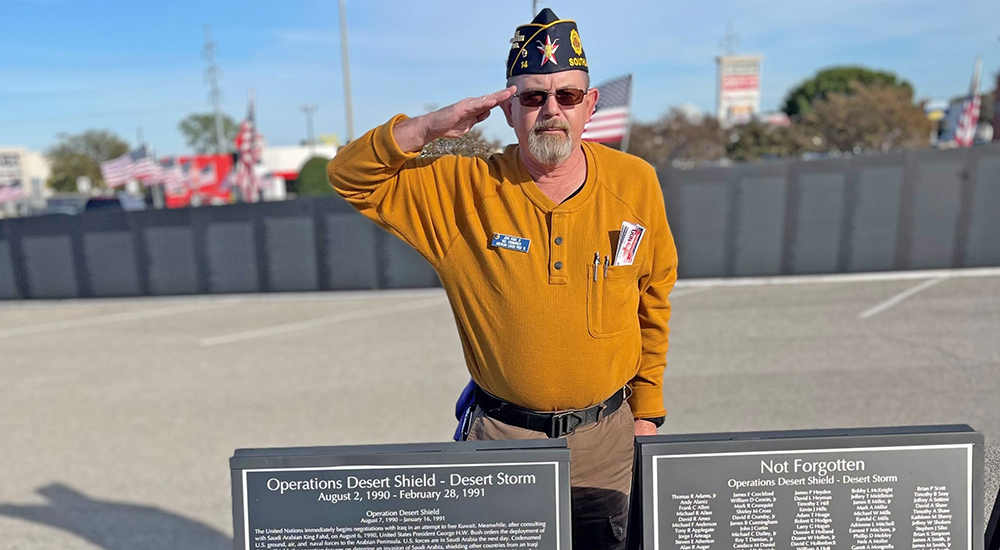Veteran Army Captain John Kirby IV uses his experience with post-traumatic stress disorder (PTSD) to help other Veterans cope with it.
He is vice commander of American Legion Post 14 in Southlake, Texas, and a lead trainer in the Military Veteran Peer Network. In these roles, Kirby works with Veterans who have mental health challenges such as suicidal thoughts and PTSD.
He said he lived with PTSD for almost 30 years before seeking the mental health support he needed. Kirby’s Army service included seeing combat in the Gulf War and being stationed in Germany.
“I’m very adamant about anything that can help a Veteran get his or her mind off of bad stuff and onto good stuff,” said Kirby.
Opened duffel bag to see what was in there
To manage his PTSD symptoms, Kirby started using VA’s PTSD Coach app and psychiatric care from North Texas VA. These enabled him to finally “open his duffel bag and see what was in there” after keeping it shut for almost 30 years.

Kirby at American Legion fundraiser. Sign is from the Berlin Wall and translates to: ATTENTION! After 300 meters border. Federal Border Guard.
PTSD Coach provides education about PTSD, information about professional care, a self-assessment for PTSD and opportunities to find support. It also has tools that can help Veterans manage their symptoms in daily life.
“PTSD Coach is an exceptionally valuable tool that allows you to tell your own story to yourself. You have to go through the bad stuff to get to the story. And even if you only tell your story to yourself, that’s a lot better than not telling it at all,” he added.
Using PTSD Coach to tell his story
Kirby is the first to admit that, as with many Veterans, he avoided seeking mental health care. He eventually began receiving cognitive processing therapy at his VA facility, and he learned about PTSD Coach in a group therapy session. Since then, he has relied on the app as a tool to track his progress and continually learn how to manage his PTSD.
“PTSD Coach helps me reflect on my trauma by journaling and having the ability to release my story and work through the healing process for myself. It’s helped me a lot just by reading some of the tips and completing daily tasks built into the app. The ability to add pictures and songs has been really helpful for me,” he said.
The app has helped Kirby track the emotional and physical strain of living with PTSD and work through it. Since using the app, he has had fewer nightmares and outbursts, and his blood pressure and cholesterol have lowered to healthy levels.
Helping other Veterans tell their story
After telling his story and learning how to cope with his PTSD, Kirby became dedicated to helping other Veterans do the same. Through his work with The American Legion, Kirby provides support for Veterans with PTSD by lending an ear. And he encourages them to seek support through VA care and virtual tools such as PTSD Coach.
“If I see a Veteran stressing out, I bring up PTSD Coach and share my experience and how they can make the same decision to get help,” he said.
Kirby is also a lead trainer in the Military Veteran Peer Network (MVPN), a Texas peer-to-peer network for any service member or Veteran or their family members. Kirby trains small groups on how to become MVPN facilitators.
He is also active in The American Legion’s Be the One initiative, which works to destigmatize asking for mental health care, provides peer-to-peer support and resources and educates everyone on how they can “Be the One” to help reduce Veteran suicide.
“If I have a bad dream, I can talk about it.”
Kirby tells Veterans not to underestimate the power of sharing their PTSD experience with other Veterans. Becoming active in The American Legion was key to helping Kirby address his PTSD. And it’s still where he turns for support when his symptoms resurface.
“At The American Legion, if I have a bad dream, I can talk about it. If I have a bad thought, I can talk about it. They’ll take it exactly as I say it and they’re not going to judge me,” he said.
Kirby’s involvement in The American Legion also enables him to give back to others while building community among Veterans who have shared experiences with loss and trauma.
He and several members of his American Legion post recently helped a Gold Star widow by fixing her porch after she reached out for support.
To learn more about PTSD Coach, visit the VA App Store.
Topics in this story
Link Disclaimer
This page includes links to other websites outside our control and jurisdiction. VA is not responsible for the privacy practices or the content of non-VA Web sites. We encourage you to review the privacy policy or terms and conditions of those sites to fully understand what information is collected and how it is used.
More Stories
Each year, I return to honor my old corpsman's memory and reflect on serving together.
Veteran was trained to collaborate with fellow Airmen. Having his buddy’s six was important, and still is.
It’s essential for Veterans to take action and prepare for tornados and spring storms while staying informed.






Thank you for sharing, Captain Kirby. I immediately downloaded the app after reading your story. I wasn’t aware the app existed. It’s on the first screen of my phone so I can share with others who might need it too.
Try PTSD coach. I suffered for over 55 years before knowing PTSD was the underlying problem that affected my everyday life all these years. I have had treatments for almost 3 years now. At my age and deep set severe and chronic PTSD I will never be cured. But knowing I have PTSD at least helps now to understand what many of my problems were linked to. It’s helps. Unfortunately they didn’t acknowledge or recognize PTSD back in my day, so too late for me now for the most part. But just knowing is something. Get help as early as you can now, don’t suffer your life away.
Since honorably discharged in 1978 and only till 2017 when I was diagnosed by VÁ having PTSD is when I knew why I lived an unbalanced life after serving in the Army for 4yrs. I was only 18 years old married right after AIT same month I reported to my first duty stationed in Germany time during Vietnam Era and within 3-weeks while temporarily assigned to the unit administration, is when I was severely traumatized then I have to remain secretly silent or else! I’m currently under the care thru VA mental and attended several programs only problem is my conscious remain abnormal more shamefully on guard. I cannot trust even my brother in-law and Im currently married at 48 years to his youngest sister, we are in mid60s. Still hurting ?
I was undiagnosed with my 70% PTSD by the VA for nearly 50 Years. I investigated my Vietnam Records and filed a case against the Navy… It recently was before a 3 Federal Jusge Appeals Court in DC & the Case won in behalf of all Veterans Discharged without any follow-up care as “Unsuitable/Personality Disorder”. My Case is now available to all other Vets in need of resolution. Peace, Robert Doyon, USS Intrepid V-2 Division Flight Deck Catapults; Arresting Gear, 1966-1968